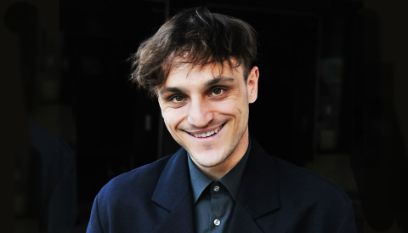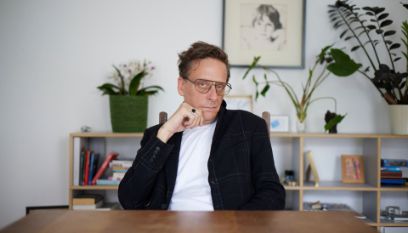Interested in becoming a screen actor?
You’ve come to the right place! Here you can find out everything you need to know on your way to becoming a professional film actor - always up to date and from first-hand experts. We connect you with professionals, teachers, and students. Join in, ask questions, and take part in the discussion.
✶ Between Intuition and Technique – Webinar with Franz Rogowski
Franz Rogowski exemplifies an unconventional path into the world of professional acting. Without formal drama school training, he made his way through dance, theatre, and film to become one of the most distinctive faces of European arthouse cinema.
This webinar explores artistic decision-making, intuitive performance, the role of the body in acting, and how actors can establish themselves in film outside of traditional training routes.
Franz Rogowski
…is considered one of the defining actors of contemporary European cinema. He began his career as a dancer and stage actor before gaining international recognition in films such as Victoria, Transit, In the Aisles, and Passages.
Rogowski has received numerous accolades, including the German Film Award for Best Actor, and was named a European Shooting Star at the 2018 Berlinale. His work is known for its physical intensity, emotional depth, and fearless choice of roles.
Wednesday, 17 September 2025, 7–8 pm
Register
The participation link will be sent immediately after registration.

✶ Acting Methods for Film – Webinar with Patrice Goodman
Meisner, Chubbuck, Chekhov – what is the best acting method for film? Whether there is a definitive answer to this question is the subject of a conversation between Kai Ivo Baulitz and Patrice Goodman. Which technique helps actors achieve greater authenticity on screen? How do these methods differ in their approach to emotion, text, and presence? And how can different approaches be combined to meet the specific demands of film acting?
Patrice Goodman
...is a Canadian film actress and Meisner technique instructor. She starred in the series Overlord and The Underwoods, and won a Canadian Screen Award for her performance in the sketch comedy Sunnyside. Her credits also include roles in The Umbrella Academy, Platinum, Ghostwriter, and The Spine. Goodman has taught acting and Meisner technique at institutions such as the Armstrong Acting Studios, the Toronto Film School, the Mallorca Film School in Spain, and the Munich Film Academy in Germany. As a coach, she has prepared actors for auditions that led to admissions into prestigious training programs as well as leading roles in film and television.
Kai Ivo Baulitz
...is a film actor, acting coach, and playwright. He teaches film acting and directing as a guest lecturer at institutions including the Folkwang University of the Arts, the Filmakademie Baden-Württemberg, and the Bern Academy of the Arts. As a playwright, his works have received multiple awards and have been featured at various theater festivals.
Wednesday, 1 October 2025, 7–8 pm
Register
The participation link will be sent immediately after registration.

✶ Expanding the stage – Webinar with Kay Voges
In conversation with Kay Voges, we will explore what the use of digital media means for the work and self-perception of actors. How does performance change through the use of cameras, projections, or virtual reality? What new forms of expression emerge – and what challenges arise from the merging of physical and digital space? What does this development mean for the training and artistic practice of performers? And how can digital technology be understood not just as a technical tool, but as an integral part of a new theatrical language?
Kay Voges
…has been engaged with digital theatre for many years and has realized numerous productions using multimedia tools that enhance narrative aesthetics. In 2018, he founded the Academy for Theatre and Digitality, where artists and technical theatre professionals have been able to complete fellowships in digital theatre since 2019. Born in Düsseldorf, Voges has worked since 1998 as a director for theatre, opera, and film, with engagements at Schauspiel and Oper Dortmund, the Staatsoper Hannover, Schauspiel Frankfurt, Schauspielhaus Hamburg, Staatsschauspiel Dresden, Schauspiel Stuttgart, the Burgtheater in Vienna, the Berliner Ensemble, and the Volksbühne Berlin. From 2010 to 2020, he served as Artistic Director of Schauspiel Dortmund, and from 2020 to 2025, as Artistic Director of the Volkstheater in Vienna. Beginning in the 2025/26 season, Kay Voges will take on the role of Artistic Director at Schauspiel Köln. His directorial work has been repeatedly recognized with prestigious national and international theatre awards.
Wednesday, 8 October 2025, 7–8 pm
Register
The participation link will be sent immediately after registration.
_Copyright_Marcel_Urlaub.jpg)
Paths to Becoming a Film Actor — Explore Your Options!
Where can I study film acting?
In the German-speaking area, there are few training programmes focused on film, such as those offered by the Academy of Performing Arts Baden-Württemberg and the Film University Babelsberg Konrad Wolf. The situation is different in English-speaking countries, which feature comprehensive training programmes in film like those at the GFCA - Giles Foreman Centre for Acting, as well as a wide range of film workshops in the framework of further education courses by private providers. While these international offers may provide insights into the craft of acting in front of the camera, they cannot substitute for a thorough academic education. Furthermore, the fees for such training are usually very high.
What is taught at a film acting school?
- Camera Acting
- Acting Techniques (e.g., Method Acting, Meisner Technique, Chubbuck Technique, Malmgren Method)
- Body and Voice Training
- Microphone Speaking
- Motion Capture, Green Screen
- Casting, E-Casting, Showreels
- Film and Screenplay Analysis
What requirements have to be met?
Important qualities certainly include acting potential, both on stage and on camera. Other personal attributes required are strong motivation, spontaneity, discipline, resilience, imagination, a solid general education, the ability to concentrate, the capacity for dialogue, the skill of giving and receiving criticism, joy in trying new things, observational skills, empathy, potential for physical, linguistic, and artistic expression, and the ability to reflect on a text.
Generally, a highschool diploma or equivalent, with specific prerequisites completed depending on the programme (in Switzerland, Matur or equivalent secondary education diploma) is required for a BA programme. If a special talent is recognized, some state schools may also admit students without a university entrance qualification. For a MA program, a BA degree or equivalent is generally necessary.
What does a film actor do?
Professional film actors work in film, television, radio, theater, or in the production of gaming and animation film. The field for actors has grown and diversified in recent years, especially with the increased production of film and series by streaming providers and the growing gaming industry.
What does an audition process look like?
Each film acting school has a different admissions procedure. Generally, a motivation letter and a video application are required, which may be supplemented by an aptitude test on-site or online. Often, an individual interview is also conducted. Learn more about the audition process for the HKB's Master in Acting for Screen and Digital Media here.
When can I start?
Courses and workshops are offered throughout the year. For higher education programmes, the academic year usually starts in either spring or autumn. The starting date for the HKB Master's programme in Acting for Screen and Digital Media is in February; you'll find the examination dates here.
Which film acting school suits me best?
It is worth thoroughly researching the institution or university you want to study at. Each acting school has its own profile and focuses on different aspects. In the Master in Acting for Screen & Digital Media at HKB, you learn what it takes to act professionally in various settings related to film and digital media. Moreover, the training at HKB is internationally oriented and the teaching language is English.
Can I discuss my options and prospects with someone?
You have the opportunity to participate in one of our webinars to answer specific questions related to a training in film acting and to ask your own questions. If you are interested in the Master's program Acting for Screen & Digital Media, the best way to proceed is to attend one of the upcoming information events or get in touch with us directly at: theater@hkb.bfh.ch.